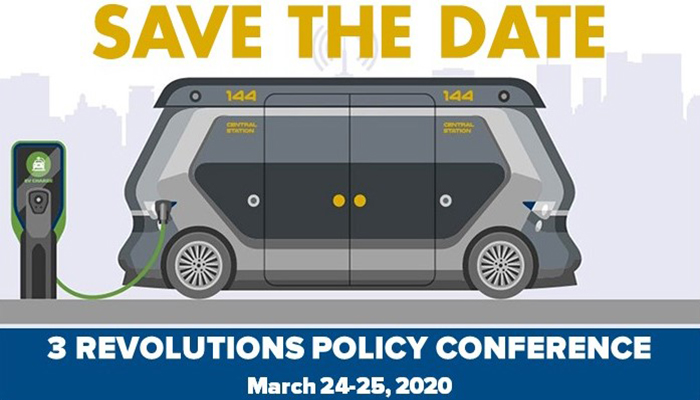Save-the-date: The 3 Revolutions Policy Conference March 24-25, 2020
Save the Date for the 4th annual 3 Revolutions Policy Conference.
The fourth Annual 3 Revolutions Policy Conference will take place March 24-25, 2020 with a cross-cutting theme of Climate and Equity. This event will leverage the success of the past three Suggesting 3 Revolutions Policy Conferences; aiming to dive deeper in identifying solutions for how the 3 Revolutions in transportation (sharing, electrification, and automation) can achieve equitable climate solutions. Key issues include data sharing, micromobility adoption, automated vehicle governance, ridehailing emission policy, and the evolution of public transit. The conference will tackle these challenges, and more, by highlighting strategies and innovative solutions. This year’s conference will engage voices from a diverse set of stakeholders, including members of disadvantaged communities, commercial drivers, car dealerships, land-use experts, energy utilities, tech companies, and elected officials.
Speaker/Session Nomination:
We seek speakers with innovative solutions and diverse experiences. Submissions will be accepted via our online submission portal on a rolling basis until Oct 15, 2019. Please feel free to share this announcement with your friends and colleagues. We are also seeking partnerships with other organizations, agencies, and companies. Please contact us directly at [email protected] if you are interested in sponsoring our 2020 conference.
Please submit a nomination for a session or a speaker that addresses one of the following questions. Note: priority will be given for those sessions and speakers able to incorporate the cross-cutting themes of Climate and Equity:
- What is the role for public policy in shaping multi-modal travel platforms that incorporate transit, bikes, scooters and ridehailing?
- How can policy or regulatory strategies suppress the number of privately owned automated vehicles?
- Can policy unlock the potential benefits of shared mobility data while addressing privacy and proprietary concerns?
- What are the most innovative and effective strategies that individual cities, states, and nations are pioneering?
Latest News & Events







